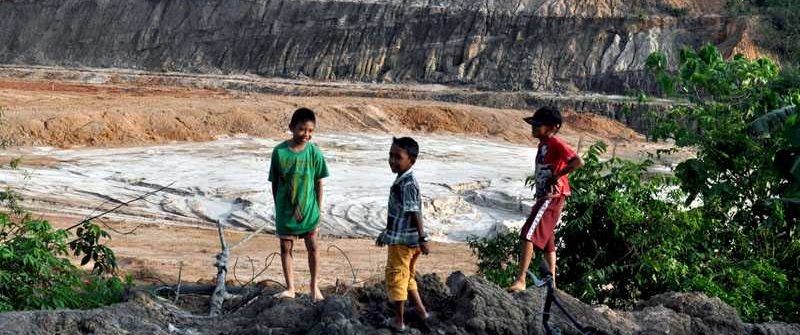
22 Oct Indonesia Omnibus Law: Riding into an environmental cul-de-sac?
By Yogi Setya Permana.
In August, the leader of the Dayak Red Army, Pangalongok Jilah, flew to Jakarta to ask President Jokowi to release Effendi Buhing from prison. Effendi is the leader of the indigenous community in Kinipan, the remaining forest in Central Kalimantan. The police arrested Effendi as he had been accused of theft, violent assault and robbery. Pangalangok regarded this as an injustice – people defending forests were being arrested, while those destroying them were free (Pahlevi, 2020). Excessive deforestation in Central Kalimantan has caused damage to the natural environment on a massive scale. As a consequence, the Dayak people are vulnerable to floods and landslides. However, it seems as if the struggle undertaken by Pangalangok Jilah and other environmental advocates will face huge challenges now the Omnibus Law has been passed.
The Omnibus Law is a massive law amending many different regulations in order to raise investments and facilitate job creation. It sparked violent protests around the country last week. Many of its critics stated that the law not only abuses workers’ rights but also tends to violate environmental standards (Aspinall 2020). The legislation process did not involve broader public participation, as it also coincided with the Covid-19 outbreak.
Since late December 2019, the Jokowi administration has given priority to discussion of the Omnibus Law in parliament. An Omnibus Law task force was set up by the government to oversee the process of legislation, which was to be completed in a short timeline. This task force consisted of more than 100 members representing various stakeholders, including some business tycoons featuring on the Indonesian Forbes list of richest men (Tirto.id, 2019). The general assumption therefore is that the law will only benefit prominent businessmen and investors. Discussion of the Omnibus Law in parliament was expected to be without difficulty, as members are predominately businessmen, making up almost 60% of parliament (Aidulsyah, et.al., 2020). Most of these businessmen are active in industries that rely on natural resources, such as energy, mining and plantations.
Strong allegations of industry interests in the Omnibus Law have put environmental issues in the public spotlight. The Omnibus Law provides industry with greater ‘flexibility’ that could have an impact on environmental degradation under the pretext of creating jobs and investment opportunities. It is seen as easing the AMDAL (environmental impact assessment) rules, which are a compulsory requirement for a business license. In the Omnibus Law scheme, the AMDAL assessor committee, consisting of experts, environmental organizations, and affected communities, is to be replaced by a due diligence team made up of government officers. The new AMDAL assessment team will consist solely of government representatives and people directly affected. This means that the government alone will examine the AMDAL documentation, supervise the assessment and even impose sanctions. The absence of an independent party potentially weakens public control in the AMDAL process.
Pangalongok Jillah’s concern about looming disasters such as floods due to uncontrolled industrial activities is undoubtedly reasonable. Flooding is not only a result of natural phenomena but is also related to human activities or, in other words, an anthropogenic disaster. The term ‘anthropogenic’ refers to human activities, whether intentional or unintentional, carried out continuously, resulting in harm to the community because they trigger and accelerate disasters. Researchers observed that anthropogenic activities increase the frequency and scale of flooding on a global level (Li-An et al. 2018: 487). A study from Bradshaw et al. (2007) on the relationship between deforestation and floods in 56 developing countries from 1990 to 2000 showed that increasing flooding events are associated with the decline of natural forest areas.
The root cause of environmental disasters is closely linked to power relations and resource ownership inequality. The Omnibus Law, however, again frames the environmental issues in a technocratic dimension through weakening public control in the AMDAL process. Instead of being a solution, depoliticization potentially exacerbates environmental damage. Easing investment rules, as the Omnibus Law does, does not help the environment. Instead it means riding into an environmental cul-de-sac.
Image: Mongabay – @Rhett Butler.
Yogi Setya Permana is a PhD researcher within the KITLV research agenda on the governance of climate change adaptation in Southeast Asia and the Caribbean. His project is a sub-national comparative analysis of climate politics in Indonesia. He is one of the panelists of the webinar ‘Indonesia’s Omnibus Law: A sign of democratic regression?‘ organized by KITLV on 27 October.
References
Aidulsyah, F., Margiansya H.D., Kurniawan, F.E., Kusumaningrum, D., Sabilla, K., & Aini, Y.N. (2020). Peta Pebisnis di Parlemen: Potret Oligarki di Indonesia. Marepus Corner Working Paper No. 01.
Aspinall, Edward. 2020. Indonesian protests point to old patterns. New Mandala. Accessed on 14 October 2020. https://www.newmandala.org/indonesian-protests-point-to-old-patterns/
Bradshaw, C.J., Sodhi, N.S., Peh, K.S.H., Brook, B.W., 2007. Global evidence that deforestation amplifies flood risk and severity in the developing world. Global Change Biology 13 (11):2379–2395. http://dx.doi.org/10.1111/j.1365-2486.2007.01446.x.
Gill, Joel C., and Bruce D. Malamud. “Anthropogenic processes, natural hazards, and interactions in a multi-hazard framework.” Earth-Science Reviews 166 (2017): 246-269.
Li-An, C., L. Billa, and M. Azari. “Anthropocene climate and landscape change that increases flood disasters.” International Journal of Hydrology 2, no. 4 (2018): 487-491.
Pahlevi, Aseanty. 2020. “Profil Pasukan Merah, Penjaga Marwah Adat Dayak dan Hutan Kalimantan.” Majalah Tempo, October 12.
Tirto.id. 2019. Daftar Satgas Omnibus Law: James Riady hingga Erwin Aksa. Accessed 13 October 2020. https://tirto.id/daftar-anggota-satgas-omnibus-law-james-riady-hingga-erwin-aksa-enxx.




No Comments